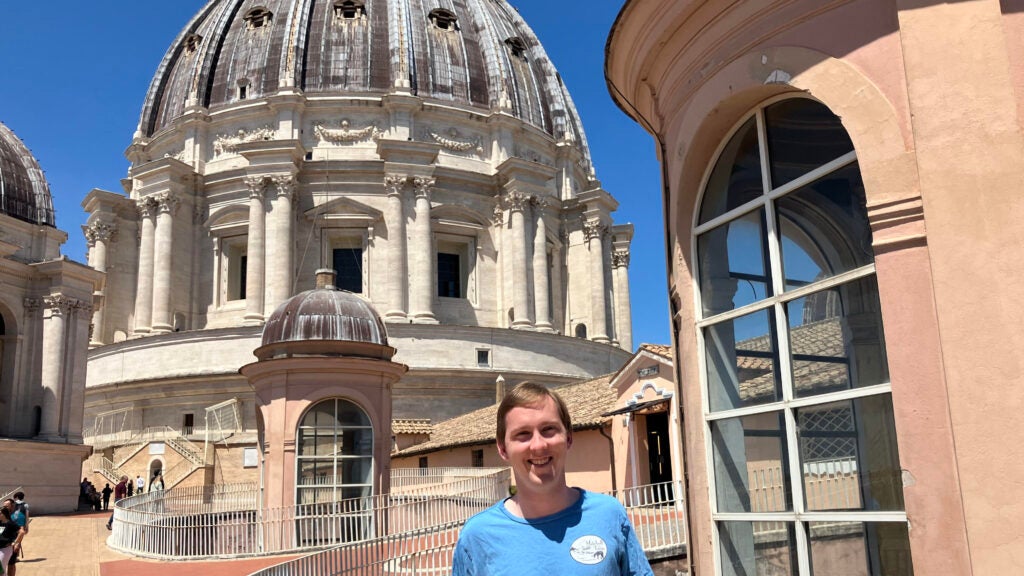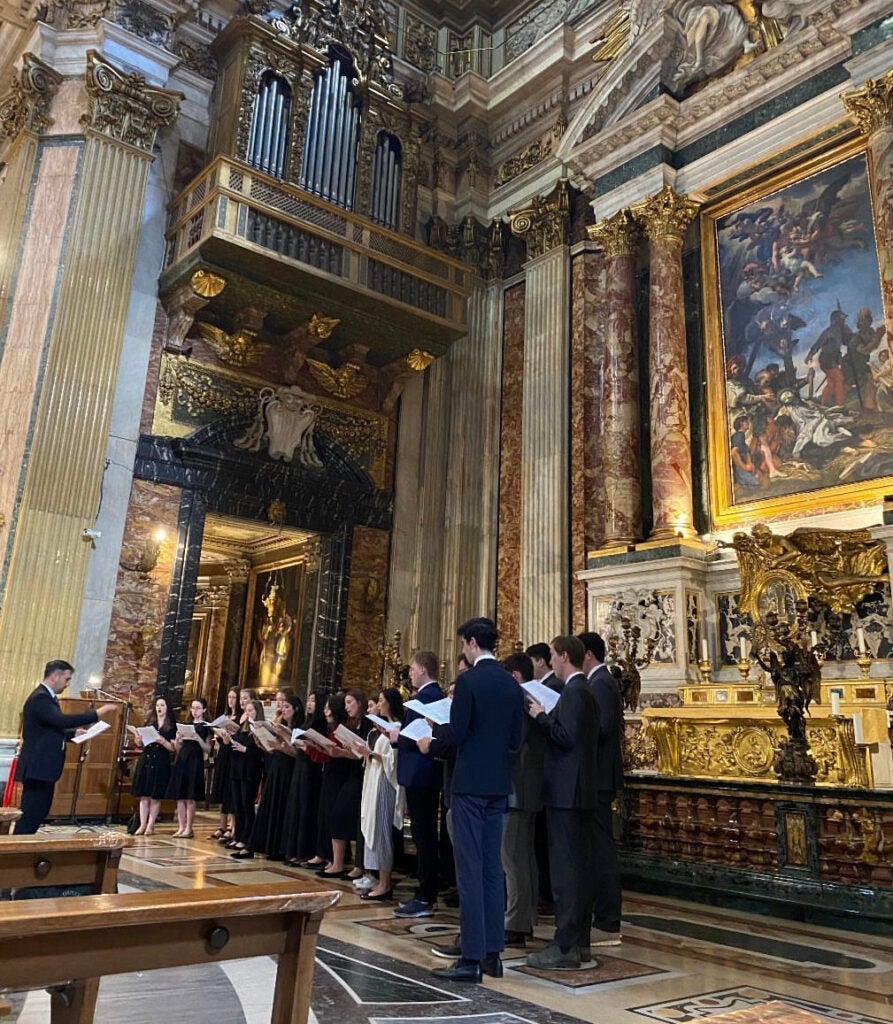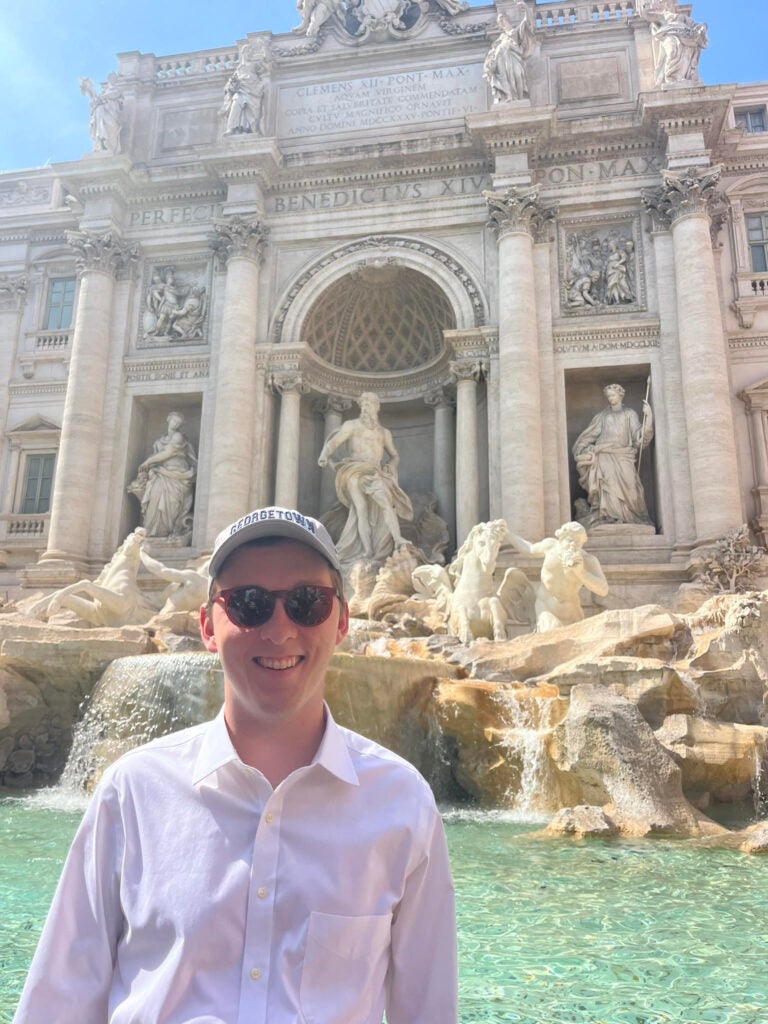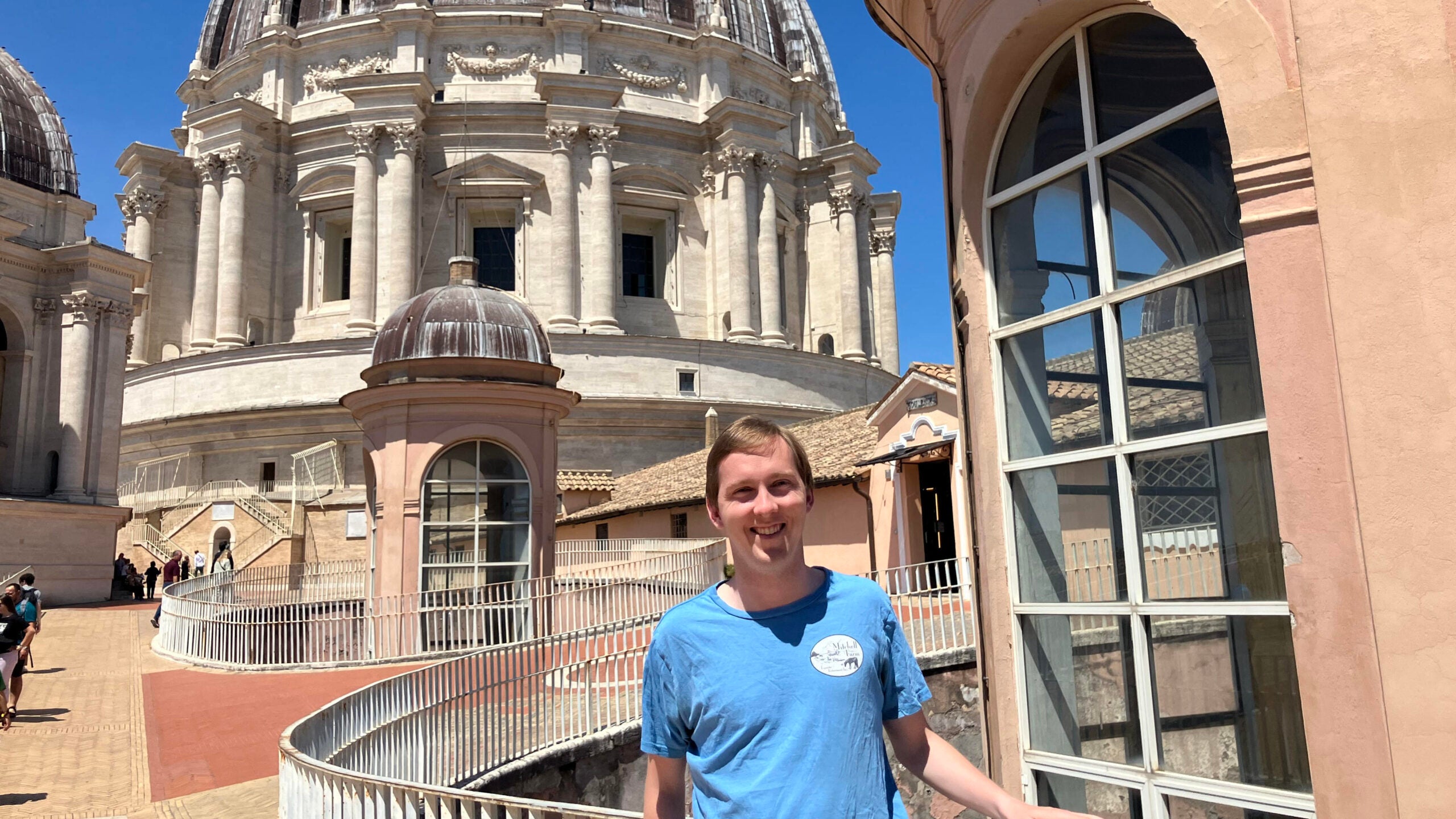Catholic Music Ministry: The Soundtrack of My Hoya Life
By Connor Hartigan (C’24)

Connor Hartigan (C’24) on the climb up the St. Peter’s Basilica dome. (Photo courtesy of Connor Hartigan).
Ego vobis Romae propitius ero.
“I will be favorable to you in Rome.”
Jesus spoke these words to St. Ignatius of Loyola at La Storta, as the founder of the Jesuits prepared to begin his ministry in the eternal city at the heart of the Catholic faith. Ignatius frequently spoke of himself as a pilgrim, a wanderer in constant search of God’s love and grace. It is thus fitting that Georgetown’s Magis Choir journeyed to the same city nearly half a millennium later. Composed of singers in both the Chapel and Contemporary Choirs that sing under the umbrella of Catholic Music Ministry, and with the leadership of Fr. Greg Schenden, S.J.,Chaplain Michelle Siemietkowski, and our director, Dr. Russell Weismann, we sought to be ministers of God’s grace and favor through our music. As always, St. Ignatius’s insight was true: God was favorable to all of us on this pilgrimage, where we found spiritual fulfillment through both music and fellowship.
Dr. Weismann often reminds us that our ministry serves three essential purposes: When we offer sacred music at Mass, we offer praise and glory to God, we touch the hearts of those who hear us, and we tend to our own spiritual needs. Our journey to Rome allowed us to do all three of these things. We spent only six days in Italy, but our itinerary was overflowing with spiritual graces.
On our first morning in Rome, we sang a popular Argentinian religious song, “Vive Jesus,” at a general audience with Pope Francis in St. Peter’s Square, with hundreds of other pilgrims joining us in the well-known tune. From there, we proceeded to sing at Mass at the Church of the Gesù, the mother church of the Jesuits and home to the final resting place of St. Ignatius. While we were all blown away by the golden Baroque splendor of the church itself, we also found beauty and grace in the austere, wood-paneled rooms in which St. Ignatius lived during his years of Roman ministry. When we gathered in the small chapel in which St. Ignatius said Mass and sang a verse of Dan Schutte’s “These Alone Are Enough,” a choir favorite and an adaptation of Ignatius’s Suscipe prayer, I’m not ashamed to say that I needed a handkerchief. Later in the week, we sang at St. Peter’s Basilica and the Basilica of St. Paul Outside the Walls, as well as taking day trips to Assisi and Naples.

Magis Choir singing in the Church of the Gesù. (Photo courtesy of Dr. Russell Weismann).
This pilgrimage deeply affected many of our singers — particularly the considerable cohort of seniors in the group, for whom the trip represented the culmination of a yearslong spiritual journey. We found consolation and closeness to God not only in our musical offerings and our visits to holy sites, but also in the more spontaneous moments of camaraderie of which our week was full.
For Sammy Orozco (C ’24), “it felt like a new beginning, one that was four years in the making. It was also a reassurance of my future and the goodness of life rather than just goodbye to those around me — whether it was doing a candlelight rosary procession around St. Peter’s Square, eating gelato every day, dodging cars and bikes in Naples, seeing flying St. Francis paintings in Assisi, or just gathering at a table together.”
Andrew Colliton (SFS ’24) felt that the standout moment was walking through St. Peter’s. “Standing and singing in the such hollowed hall surrounded by the giants of the Church, I felt the power and glory of my Catholic faith. The feeling of being a small part of an immensely large whole — the choir, Georgetown, Christians, humanity — struck deep into my heart.”
Eamon Walsh (C ’24) found particular meaning in our excursion to Assisi, where we visited the Basilicas of St. Francis and St. Clare. “Growing up, I attended St. Clare’s Parish in Portland, OR, and I heard the stories of St. Clare and St. Francis throughout my youth. Being able to visit the town where they performed their works, and also being able to see their tombs, was so powerful.”
In addition to the personal spiritual graces that we received in these holy sites, one of the most powerful aspects of any trip to Rome is the chance to see both the diversity and the universality of the Catholic faith, as we gather in prayer with pilgrims from all over the world. At the general audience (where speakers addressed Pope Francis in nine languages), at Mass, and in other sacred sites, we saw the rich tapestry of the Body of Christ, which knows no national or linguistic boundaries. Natalie Cappuzzo (C’21, L ’24), the longest-serving singer in the Magis Choir, reported that her favorite part was the spur-of-the-moment decision to go to the candlelight rosary procession in St. Peter’s Square for the Feast of Madonna della Strada. “I felt so connected to God seeing everyone praying the rosary in different languages but with the same prayerful intention.”
I shared the feelings of my fellow graduating students; coming as it did at the close of my years on the Hilltop, this trip carried a special spiritual and emotional meaning for me. My own experience at Georgetown was in large part defined by my years in Catholic Music Ministry. This musical faith community was the first home I found at college, even during my freshman year, when the coronavirus pandemic obliged us to compile synchronized recordings, in lieu of regular, in-person rehearsals and Masses. From the moment I arrived on campus, weekly ministry as a cantor and a singer in the Chapel Choir constituted the soundtrack of my Hoya life. Mass with Catholic Music Ministry was the source and summit of each week that I spent at Georgetown; more than any other class or activity, I found the meaning of my college years in this weekly act of service. Our Italian pilgrimage was thus the perfect capstone for my four years in the Georgetown community.

Connor in front of the Trevi Fountain. (Photo courtesy of Connor Hartigan).
On our final afternoon in Rome, Fr. Schenden took several of us to visit the Church of Sant’Ignazio, a tour de force of Jesuit Baroque architecture, where we once again saw the words of Christ to St. Ignatius, painted on the wall above the altar: Ego vobis Romae propitius ero. Fr. Schenden read these words for us, and began to reflect on the circumstances under which St. Ignatius heard them.
“At this point in his journey, Ignatius had no idea what he was getting himself into,” he pointed out. “Yet his faith in God was stronger than any of his fears or doubts. He kept saying yes to God, and God said yes to him.” He then broke into his characteristic smile: “And here we are in this beautiful church, five hundred years later…and we’re here because of Ignatius’s devotion. God has been very favorable to us indeed!”
As I walked out of Sant’Ignazio and prepared to leave the city where God had been so favorable to me, Fr. Schenden’s words echoed in my mind and soul. Throughout the previous weeks, as I finished my final assignments, enjoyed the often-raucous festivities of Senior Week, and celebrated the chaotic days of commencement, the prospect of parting ways with both the Catholic Music Ministry community and my broader Hilltop home had filled me with sadness. Yet as I took a final look back at God’s words on the walls of Sant’Ignazio, I realized that I have nothing to fear from the future. Our pilgrimage helped me understand that, like St. Ignatius, all I have to do as I venture into the wider world is trust in God’s unconditional love. He was favorable to me in Rome, and will continue to bless and favor all of us who came together to give glory to him in song.
Connor Hartigan (C’24) is an O’Hare Fellow at America Media.
Fr. Greg Schenden, S.J. is the director of Campus Ministry.
Chaplain Michelle Siemietkowski is the Catholic chaplain for spiritual formation and a residential minister to off-campus students.
Dr. Russell Weismann is the liturgical music director and organist.
- Tagged
- Catholic
- Magis Choir
